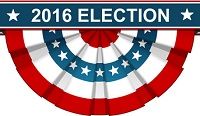Article
Politics: Why Don't Doctors Vote and Will this Time Be Different?
Author(s):
Do physicians feel voting is a waste of time? They are less likely to go to the polls than the average person, and far less likely to cast ballots than lawyers.

In a bitter presidential race with two polarizing candidates, analysts have been uncertain whether disinterest or disgust would have an impact on turnout.
The question is even harder to answer when it comes to the more than one million licensed physicians in the US.
Considering how educated doctors are, and how much money they make, it surprises many people to learn that physicians are less likely to vote than the average US resident.
About 42% of the nation's physicians cast ballots the last time the trend was analyzed: elections from 1996 through 2002.
In that study, published in the Journal of General Internal Medicine, 64% of lawyers voted while the turnout in the general public was 50%.
On Nov. 8, will physicians vote according to their party allegiance (the majority are Democrats), and among those who do vote, what will the deciding issues be?
David Grande, MD, MPA, Assistant Professor of Medicine, Perelman School of Medicine, Director of Policy at the Leonard Davis Institute of Health Economics and Associate Director, RWJF Clinical Scholars Program at the University of Pennsylvania wrote the paper that found the non-voting trend in physicians.
Will his findings hold up this year?
“It is really hard to say if this election will be any different,“ Grande said. He has not done a follow-up study.
In the study he and colleagues suggest that medical schools may chose entrants who are “civically disengaged” and more focused on science. Or, it could be that doctors care so much about the civic good they are doing in practicing medicine that voting seems relatively trivial, they said.
In the Nov. 8 election, two factors might lead to more doctors voting, he said, the fact that it is a presidential election, and the uncertainty over the future of health care in the US post-Affordable Care Act. The two candidates have wildly divergent views on that topic and that could bring doctors to the polls, he said.
“Over the last eight years, health care has been an enormous issue politically so perhaps that will engage doctors more,” he said.
“However, health care was frequently a big political issue in past elections even back during the time period we studied, so it is really hard to say if things will be different,” Grande added.
,
To Clarence Lam, MD, MPH, a board-certified preventive medicine specialist at the Johns Hopkins Bloomberg School of Public Health, taking part in politics and the electoral process is a passion.
He is a delegate to the Maryland General Assembly.
Like Grande he thinks healthcare will be a big issue and that “There’s a very different view between the two candidates.”
But he also believes that many physicians are simply disinterested in politics.
As scientists, physicians think linearly, Lam said. The forces that shape policy make up a process that is at odds with how their own minds work.
“It’s not how they are trained,” he explained, “Doctors know a diagnosis leads to action then to outcome.’
Politics and government policies are not that cut and dried.
“Things are going in different directions,” he said. Casting a vote—unlike making a treatment decision—may not have the desired result, or any result.
Frustrated, physicians may decide they have better things to do with their very scarce time.
It is also a matter of debate whether physicians’ party allegiances are based on health policy or other medicine-related issues or whether their party preferences comes from other priorities. Those include how important money is to them.
Yale University researchers created a database using the federal National Provider Index and cross-referencing each physician by name to state voter files, to see if they registered a party preference.
They were also able to correlate medical specialties with party affiliation. One of the most striking patterns to emerge was that the higher the typical salary for a specialty, the more likely the physician was to be a Republican, with Democrats clustering in lower paying specialties. Surgeons, for example, are mostly Republicans.
One possibly confounding factor is that since women physicians tend to be lower paid, and also tend to identify as Democrats, their increasing presence in certain specialties has had the unintended consequence of bringing the pay in that field down while at the same time making its practitioners more likely to be Democrats.
Researchers found doctors overall are more likely to be Democrats, a switch from a few decades ago when business concerns were paramount for physicians since the default model was a being in a small or solo practice.
Increasingly, physicians are employed by healthcare systems or in large group practices.
Still, taking money out of the equation, there is a close connection between believing in a party’s tenets and how physicians practice their specialties. That's particularly true when it comes to emotionally charged issues like abortion, or giving hepatitis C drugs to patients who still use illegal drugs, and whether to query patients about having guns in their homes, the authors noted in a New York Times interview about their studies.
Political ideology may or may not influence whether a physician votes, but it could shape how he or she practices medicine.



